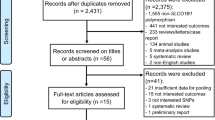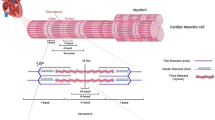Abstract
Arising from L. M. Mangravite et al. Nature 502, 377–380 (2013); doi:10.1038/nature12508
All HMG-CoA reductase inhibitors (statins) can cause muscle injury ranging from asymptomatic elevations in creatine kinase levels to severe muscle breakdown (rhabdomyolysis) leading to kidney failure and death1, and the genetic variants responsible for this uncommon adverse drug reaction remain largely undiscovered. Mangravite et al. reported a new locus in the gene GATM (rs9806699) that was associated with a decreased risk of muscle injury in two case-control studies of myopathy (odds ratio, 0.60)2. In a larger case-control study of statin-related rhabdomyolysis, a more severe form of muscle injury, we were unable to replicate this finding. This failure to replicate raises questions about the role of GATM in statin-related muscle injury. There is a Reply to this Brief Communication Arising by Mangravite, L. M. et al. Nature 513, http://dx.doi.org/10.1038/nature13630 (2014).
This is a preview of subscription content, access via your institution
Access options
Subscribe to this journal
Receive 51 print issues and online access
$199.00 per year
only $3.90 per issue
Buy this article
- Purchase on Springer Link
- Instant access to full article PDF
Prices may be subject to local taxes which are calculated during checkout
Similar content being viewed by others
References
Thompson, P. D., Clarkson, P. & Karas, R. H. Statin-associated myopathy. J. Am. Med. Assoc. 289, 1681–1690 (2003)
Mangravite, L. M., Engelhardt, B. E., Stephens, M. & Krauss, R. M. A statin-dependent QTL for GATM expression is associated with statin-induced myopathy. Nature 502, 377–380 (2013)
Marciante, K. D. et al. Cerivastatin, genetic variants, and the risk of rhabdomyolysis. Pharmacogenet. Genomics 21, 280–288 (2011)
Floyd, J. S. et al. A screening study of drug–drug interactions in cerivastatin users: an adverse effect of clopidogrel. Clin. Pharmacol. Ther. 91, 896–904 (2012)
Staffa, J. A., Chang, J. & Green, L. Cerivastatin and reports of fatal rhabdomyolysis. N. Engl. J. Med. 346, 539–540 (2002)
Carr, D. F. et al. GATM gene variants and statin myopathy risk. Nature 513, http://dx.doi.org/10.1038/nature13628 (2014)
Tamraz, B. et al. OATP1B1-related drug–drug and drug–gene interactions as potential risk factors for cerivastatin-induced rhabdomyolysis. Pharmacogenet. Genomics 23, 355–364 (2013)
Kameyama, Y., Yamashita, K., Kobayashi, K., Hosokawa, M. & Chiba, K. Functional characterization of SLCO1B1 (OATP-C) variants, SLCO1B1*5, SLCO1B1*15 and SLCO1B1*15+C1007G, by using transient expression systems of HeLa and HEK293 cells. Pharmacogenet. Genomics 15, 513–522 (2005)
SEARCH Collaborative Group et al. SLCO1B1 variants and statin-induced myopathy–a genomewide study. N. Engl. J. Med. 359, 789–799 (2008)
Voora, D. et al. The SLCO1B1*5 genetic variant is associated with statin-induced side effects. J. Am. Coll. Cardiol. 54, 1609–1616 (2009)
Linde, R., Peng, L., Desai, M. & Feldman, D. The role of vitamin D and SLCO1B1*5 gene polymorphism in statin-associated myalgias. Dermatoendocrinol. 2, 77–84 (2010)
Carr, D. F. et al. SLCO1B1 genetic variant associated with statin-induced myopathy: a proof-of-concept study using the clinical practice research datalink. Clin. Pharmacol. Ther. 94, 695–701 (2013)
Fried, L. P. et al. The Cardiovascular Health Study: design and rationale. Ann. Epidemiol. 1, 263–276 (1991)
Psaty, B. M. et al. Assessing the use of medications in the elderly: methods and initial experience in the Cardiovascular Health Study. The Cardiovascular Health Study Collaborative Research Group. J. Clin. Epidemiol. 45, 683–692 (1992)
Author information
Authors and Affiliations
Contributions
J.C.B. and J.S.F. carried out the analyses. B.M.P. obtained the funding for this work. J.S.F., F.C.B., J.A.B., S.R.H., K.R. and B.M.P. contributed to the design of the analyses and the drafting and revision of the manuscript.
Corresponding author
Ethics declarations
Competing interests
B.M.P. serves on the data and safety monitoring board (DSMB) for a clinical trial of a device funded by the manufacturer (Zoll LifeCor).
Rights and permissions
About this article
Cite this article
Floyd, J., Bis, J., Brody, J. et al. GATM locus does not replicate in rhabdomyolysis study. Nature 513, E1–E3 (2014). https://doi.org/10.1038/nature13629
Received:
Accepted:
Published:
Issue Date:
DOI: https://doi.org/10.1038/nature13629
This article is cited by
-
Correlation between single-nucleotide polymorphisms and statin-induced myopathy: a mixed-effects model meta-analysis
European Journal of Clinical Pharmacology (2021)
-
The association of GATM polymorphism with statin-induced myopathy: a systematic review and meta-analysis
European Journal of Clinical Pharmacology (2021)
-
Muscle phenotype of AGAT- and GAMT-deficient mice after simvastatin exposure
Amino Acids (2020)
-
Effects of SLCO1B1 and GATM gene variants on rosuvastatin-induced myopathy are unrelated to high plasma exposure of rosuvastatin and its metabolites
Acta Pharmacologica Sinica (2019)
-
The adjuvant value of Herba Cistanches when used in combination with statin in murine models
Scientific Reports (2017)
Comments
By submitting a comment you agree to abide by our Terms and Community Guidelines. If you find something abusive or that does not comply with our terms or guidelines please flag it as inappropriate.



